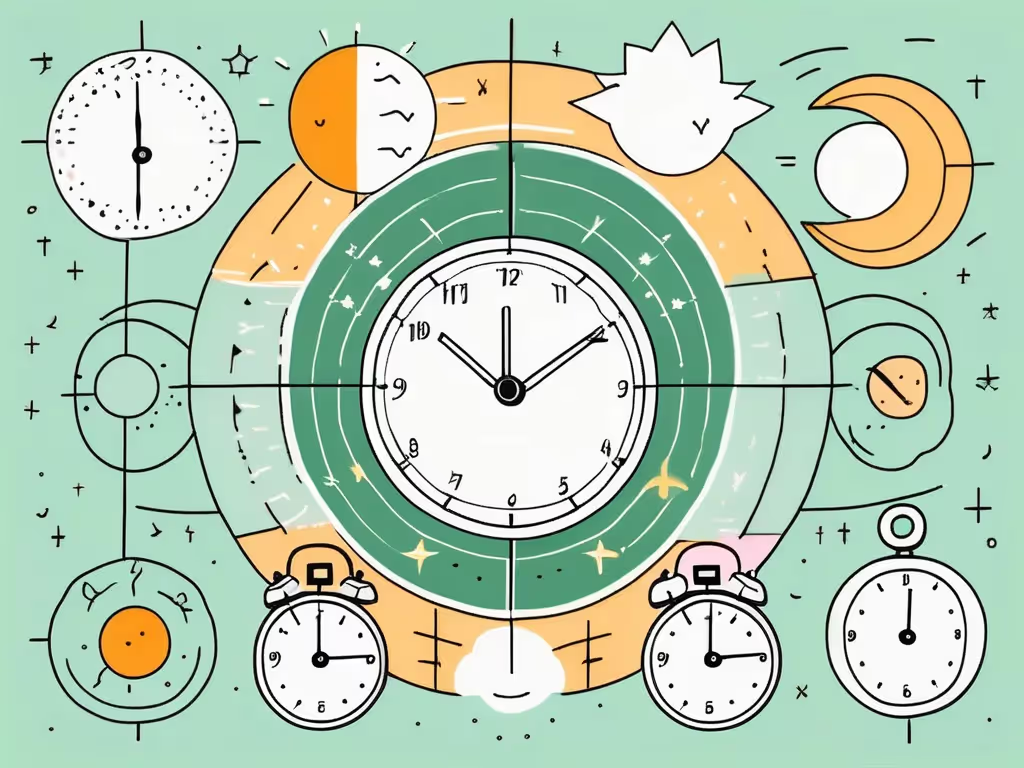Polyphasic sleep has gained popularity in recent years as an alternative sleep schedule that promises increased productivity and more time in the day. But what exactly is polyphasic sleep, and is it suitable for everyone? In this article, we will explore the science behind polyphasic sleep, different types of polyphasic sleep schedules, the suitability of polyphasic sleep for individuals, and the considerations one should have before adopting this sleep pattern.
Understanding Polyphasic Sleep
Polyphasic sleep is a sleep pattern that involves breaking up sleep into multiple shorter periods throughout the day, rather than the traditional monophasic sleep pattern of one long sleep period at night. This sleep schedule is based on the idea that shorter, more frequent periods of sleep can provide the same amount of rest as one long sleep period.
But what exactly happens during polyphasic sleep? Let's delve into the science behind it.
The Science Behind Polyphasic Sleep
Recent data shows that our sleep cycles are composed of various stages, including rapid eye movement (REM) sleep and non-rapid eye movement (NREM) sleep. Polyphasic sleep aims to optimize the amount of time spent in these different sleep stages to maximize the benefits of sleep.
During REM sleep, our brains are highly active, and this is when most dreaming occurs. It is believed to play a crucial role in memory consolidation and emotional regulation. NREM sleep, on the other hand, is divided into three stages and is responsible for physical restoration and growth.
Proponents of polyphasic sleep argue that by strategically scheduling shorter sleep periods, individuals can increase the amount of time spent in REM and NREM sleep, leading to improved cognitive function, increased creativity, and enhanced productivity.
On the other hand, some researchers argue that disrupting the natural sleep-wake cycle can have negative consequences on our overall sleep quality and health. This may be because polyphasic sleep schedules often result in sleep deprivation, which can lead to impaired cognitive function and increased risk of health issues.
It is essential to consider both sides of the argument before deciding to adopt a polyphasic sleep schedule.
Different Types of Polyphasic Sleep Schedules
There are several types of polyphasic sleep schedules, each with its own unique sleep-wake patterns. Let's explore some of the most well-known ones:
The Uberman sleep schedule is perhaps the most extreme form of polyphasic sleep. It consists of six 20-minute naps evenly spaced throughout the day, totaling only two hours of sleep. This schedule aims to maximize the time spent in REM sleep, as it is believed to be the most restorative stage.
The Everyman sleep schedule involves a longer core sleep period of around three to four hours at night, supplemented by several short naps throughout the day. This schedule strikes a balance between maintaining a regular sleep pattern and incorporating shorter sleep periods for increased restfulness.
The Dymaxion sleep schedule, popularized by inventor Buckminster Fuller, involves taking four 30-minute naps throughout the day, totaling only two hours of sleep. This schedule is known for its potential to increase productivity and reduce the need for extended periods of rest.
Lastly, the Biphasic sleep schedule is a more moderate approach to polyphasic sleep. It involves one core sleep period of around five to six hours at night, supplemented by a shorter nap during the day. This schedule is relatively easier to adapt to and provides a balance between maintaining a regular sleep routine and incorporating additional rest.
Despite the potential benefits of polyphasic sleep, it is important to consider the suitability of this sleep pattern for individuals. Factors such as lifestyle, work demands, and personal preferences should be taken into account before embarking on a polyphasic sleep journey.
Suitability of Polyphasic Sleep
Who can benefit from polyphasic sleep? Some individuals who have demanding lifestyles and need to maximize their waking hours may find polyphasic sleep appealing. Entrepreneurs, shift workers, and individuals with irregular work schedules may benefit from the increased productivity and flexibility that polyphasic sleep offers.
For entrepreneurs, polyphasic sleep can be a game-changer. Running a business requires long hours and constant attention to detail. By adopting a polyphasic sleep schedule, entrepreneurs can ensure that they have more time in their day to focus on their business ventures. With increased productivity and alertness, they can make crucial decisions and seize opportunities without feeling overwhelmed by fatigue.
Shift workers, such as nurses, police officers, and factory workers, often have irregular work schedules that can disrupt their natural sleep patterns. Polyphasic sleep can provide them with a solution to manage their sleep and wakefulness effectively. By dividing their sleep into multiple shorter naps throughout the day, they can adapt to their changing work shifts and maintain optimal performance.
Potential Drawbacks and Health Risks
However, it is crucial to consider the potential drawbacks and health risks associated with polyphasic sleep. Sleep deprivation, which often occurs during the transition phase of adopting a new sleep schedule, can have a significant impact on both physical and mental health. It may result in decreased alertness, impaired memory and concentration, and increased susceptibility to illness.
During the initial adjustment period, individuals may experience difficulties in falling asleep during their scheduled naps or may wake up feeling groggy and disoriented. This can be frustrating and may require patience and perseverance to overcome. Additionally, maintaining a consistent sleep schedule can be challenging, especially when social obligations or unexpected events arise.
Furthermore, the long-term effects of polyphasic sleep on overall health and well-being are still not fully understood. While some individuals may thrive on this sleep pattern, others may experience negative consequences. It is essential to monitor one's physical and mental health closely and seek professional advice if any adverse symptoms arise.
This is where Aura Health App can be of great help. With its personalized sleep tracking and guidance, it can assist users in transitioning to a polyphasic sleep schedule while prioritizing their well-being. The app provides valuable insights into sleep quality, duration, and patterns, allowing users to make informed decisions about their sleep schedule. Additionally, it offers relaxation techniques and meditation exercises to promote better sleep and reduce stress levels.
By using the Aura Health App, individuals can optimize their polyphasic sleep experience and mitigate potential risks. With its comprehensive features and user-friendly interface, the app empowers users to take control of their sleep habits and achieve a balance between productivity and well-being.
Considerations Before Adopting Polyphasic Sleep
Transitioning to a polyphasic sleep schedule requires careful consideration of lifestyle and occupational factors. Individuals with regular 9-to-5 jobs may find it challenging to adhere to a polyphasic sleep schedule due to social commitments and work restrictions.
Lifestyle and Occupational Factors
Flexibility in one's daily routine, minimal social commitments during sleep periods, and the ability to nap or rest during the day are crucial factors to consider when adopting a polyphasic sleep schedule. Additionally, it is essential to communicate with employers or coworkers to ensure that the new sleep pattern does not negatively impact professional responsibilities.
Health and Medical Precautions
Prioritizing one's health is paramount when considering any alteration to the sleep-wake cycle. Potential medical concerns, such as sleep disorders or existing health conditions, should be discussed with a healthcare professional to ensure that polyphasic sleep is a safe and suitable option.
Transitioning to a Polyphasic Sleep Schedule
Transitioning to a polyphasic sleep schedule can be a challenging process both mentally and physically. It is important to consider whether a gradual transition or an immediate change is more suitable for each individual.
Gradual Transition vs. Immediate Change
Gradually transitioning to a polyphasic sleep schedule allows the body to adapt more gradually, minimizing the symptoms of sleep deprivation experienced during the transition phase. On the other hand, some individuals may find it easier to make an immediate change, embracing the novelty and accepting the potential short-term challenges.
Coping with Sleep Deprivation During Transition
During the transition phase, it is crucial to establish a supportive routine that prioritizes rest and recovery. Taking short naps when needed, avoiding stimulating activities close to sleep periods, and practicing good sleep hygiene can all help to cope with sleep deprivation and facilitate the adjustment to the new sleep schedule.
Maintaining a Polyphasic Sleep Schedule
Once you have successfully transitioned to a polyphasic sleep schedule, maintaining the schedule becomes essential. Here are some tips for sticking to your schedule:
Tips for Sticking to Your Schedule
- Create a consistent sleep routine, adhering to the same sleep and wake times every day.
- Minimize distractions and create a sleep environment that is conducive to restful sleep.
- Utilize tools and technologies, such as Aura Health App, to track your sleep patterns and receive personalized guidance and reminders.
Despite the challenges, many individuals have successfully maintained a polyphasic sleep schedule and found it to be a sustainable way of life.
Dealing with Social and Professional Challenges
One of the major challenges of adopting a polyphasic sleep schedule is dealing with social and professional commitments during sleep periods. Communicating openly with friends, family, and coworkers about your sleep schedule and setting boundaries can help manage expectations and minimize disruptions. Prioritizing self-care and expressing your needs can contribute to a healthier work-life balance.
Regardless of the sleep schedule you choose, it is important to prioritize your overall well-being and listen to your body's signals. Remember, Aura Health App is here to support you on your sleep journey, providing personalized guidance and insights to help you make the most of your sleep.
Aura is Your All In One App for Meditation, Mindfulness Wellbeing
Find peace every day with one app for your whole well-being. There is no one-size-fits-all solution to mental well-being. Aura is the first all-in-one wellness app that learns how to best help you. Discover an endless library of expert-created tracks for your well-being, all taught by the world’s best coaches, therapists, and storytellers. With Aura's personalized recommendations, you can find peace every morning, day and night.



.webp)






.avif)

%20(1).avif)


.avif)
.avif)
.webp)


.avif)


















































































































.avif)

















.svg)









